
EMAX BABYHAWK-R
Inhalt:
Page 1: Review
Page 2: Betaflight Setup
Page 3: Adding LED Strip
Exclusive Banggood Coupon Codes
▪ For our readers we have received exclusive discount coupon codes from Banggood, with which you can save up to 25% when buying Mavic, Spark, Mini FPV Racers and accessories such as Runcam Split, FrSky XLITE, antennas, etc. You can find these coupons on our coupons page. This section is constantly updated, so check back often.
Babyhawk-R
Since 2017 some really ingenious Mini FPV racers came onto the market – especially the Leader 120. But since then a lot has changed again, and there are some new FPV racers that also have what it takes to become a cult racer. Here’s the Babyhawk-R.
Most Mini Quads 2018 have one thing in common: they become more and more omnivores and swallow not only 2S Lipos, but meanwhile also 3S or even 4S! The Lizard95 already shows impressively how much power you can get out of a 3S Lipo with a mini FPV racer. The Babyhawk, especially the 3-inch version, is even designed for 4S.
Babyhawk-R: Three Versions
The EMAX Babyhawk-R can be flown with 3S or 4S Lipos and has a lot of features, so you don’t have to do much modding anymore. It comes in two variations (well, actually three):
2 inch version (112mm)
3 inch version (136mm)
as well as a 2.5 inch version (actually the 2 inch version with “upgrade” frame)
The 2.5 inch version is a modified 2 inch version with 2.5 inch arms, which allows you to install larger propellers. The 2 inch version flies quite lively and is generally designed for 3S, while the 3 inch version allows a slightly longer flight time and also easily carries the extra weight of a 4S lipo. The modded 2.5 inch version is somewhere in between.
Which variant you choose is up to your personal taste. The equipment is very much the same for the 2 inch and the 3 inch version and differs only in the frame size, the propeller size and the motors. In general one can say that the 2 inch version is rather designed for 3S and the 3 inch version flies quite well with 4S. For the 2 inch version a 4S Lipo would be a bit too big and heavy – but you can do so, if you want to.
The 3 inch version comes with EMAX RS1106 4500KV motors and 3 inch EMAX AVAN Mini Props, the 2 inch version with Emax RS1106 6000KV motors and Emax Avan Micro 2 inch 4-Blade Props:
| EMAX Babyhawk-R Versions: | |
|---|---|
| 2 Inch | 3 Inch |
| Emax Avan Micro 2 Inch 4-Blade Props | MAX AVAN Mini 3 Inch 3-Blade Props |
| Emax RS1106 6000KV Motors | EMAX RS1106 4500KV Motors |
| 3S Lipo suggested | 4S Lipo suggested |
| Size: 112mm | Size: 136mm |
| Flies more agile | Longer flight times |
Design
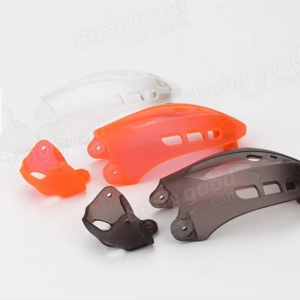
Advantage: under the cover the electronic insides of the Babyhawk are very well protected. So it’s definitely a plus. The hood is fixed with two screws and can be removed relatively quickly. The hood is available in three colors – black, red and transparent white – and is also available separately for a few bucks.
Equipment
The video transmitter can be switched between 25mW and 200mW ouput power, providing sufficient power for interference-free transmission. In addition, the Babyhawk-R has a Foxeer Arrow Micro CCD camera built-in, which is almost equal to a Runcam Micro Swift. Just like the Runcam Micro, the Foxeer Cam also offers a quite extensive OSD menu with which you can adjust colors, exposure, contrast, sharpness etc. down to the last detail. The Foxeer Cam also offers WDR (Wide Dynamic Range) to compensate for large differences in brightness. The Foxeer Arrow Micro has two major advantages over a Runcam Micro: firstly, the dongle used to navigate through the OSD menu is already included with the Babyhawk-R (in contrast, it must be purchased separately for the Runcam Micro). The biggest advantage over the Runcam Micro is that the Foxeer can handle an input voltage of 5V to 40V, the Runcam Micro only 5V. Nice to see that Emax gave the Babyhawk-R a very decent cam!
What stands out about the EMAX Babyhawk-R is the Low ESR Capacitor soldered on the side. This is supposed to reduce video noise. We are not sure if this is really necessary, but unlike the Diatone Mini Racers, there is hardly any noise in the video image of the Babyhawk-R. Whether this thing really makes sense or not, you only find out if you cut it off. But it doesn’t really bother.
Compared with the Diatone GT-R90, and the Diatone GT-M3 the EMAX Babyhawk-R performs a little worse in terms of performance, but still flies brilliantly and is also available for a cheaper price. But the equipment is a bit more economical compared to the Diatones, the Babyhawk-R comes with a F3 flight controller instead of a F4.
The ESC of the Babyhawk can handle a good 12A, come with DSHOT600 and can be flashed with the very latest BLHeli_S firmware, so that DSHOT commands are also available if desired.
The Babyhawk-R’s on-board BEC delivers sufficient power with 3A – even the installation of an LED strip should pose no problem. A buzzer is also installed – this inconspicuous but vital component is often forgotten by manufacturers.
| EMAX Babyhawk-R Features: | |
|---|---|
| Flight Controller | Omnibus F3 Betaflight, 20x20mm (M2) |
| MCU | STM32F303 |
| OSD | Betaflight OSD |
| Buzzer | ✔️ |
| BEC | Integrated 5V@ 3A BEC |
| Receiver Types | PPM/SBUS/Spektrum DSM |
| ESC: | BLHeli_S 12A 4-in-1 DSHOT600 |
| Camera | Micro CCD |
| VTX | 40 Channel 5.8g 25/200mw |
Our Impression
Foxeer Arrow Micro
Contrary to our expectations, the Foxeer Arrow is absolutely on a par with the Runcam Micro Swift – if not superior. Once you’ve looked through the cam’s OSD and found the right settings, the video image is simply perfect in terms of contrast, sharpness, dynamic range and details. The Foxeer copes well with changes in brightness. The Foxeer always delivers a perfect picture, especially with the Wide Dynamic Range feature enabled. This makes the Babyhawk the first Mini Racer we’ve ever seen that the manufacturer has already provided us with an absolutely usable cam. Very commendable.

Realacc Stubby
Design & Quality
The striking design of the Babyhawk-R with its hood proves to be very practical in everyday use: the electronics are well protected in there. The hood is fixed at the front as well as at the rear with two screws. Just loosen the two rear screws and it folds forward like the bonnet of a car. The frame is very stable and can withstand a lot. The Avan Mini Props can also withstand a lot and do not break right away. The soldering points of the motor pads are not as fragile with the Babyhawk as with many other Minis, but if you like to swing the soldering iron, you can go over it again. Experience has shown that it is precisely at these points that motor cables are often disconnected by constant vibration. Here it really depends on solid soldering work.
Flight Characteristics
The agility of the Babyhawk is more comfortable – at least when compared to the Lizard95 Anniversary Edition, which shows significantly more speed and acceleration. Nevertheless, the Babyhawk 3 Inch also has enough power with 3S for a decent punch. A “Need for Speed”-feeling like with the Lizard doesn’t come up here, but the Babyhawk flies very “smooth”, pleasant and exact.
With 3S 650 mAh it flies quite well. Using a 4S 650 mAh, however, showed only 10%-15% more agility and power, but a slightly shorter flight time. This is a little disappointing, because one of the Babyhawk’s advantages should be to take 4S Lipos as well. Okay, it does – but the difference between 3S and 4S is not really worth it here. The Babyhawk-R flies best with 3S Lipo that does not bring too much weight. 4S doesn’t really seem to bring any advantages to the Babyhawk 3 Inch, unless you settle for Lipos below 500 mAh and therefore a very short flight time.
Flighttimes
The flight time of our test flights with 3S 650 mAh Lipos with aggressive flight style was just over three minutes. With a 4S 650 mAh even a little bit below. But if you like it a bit more relaxed and prefer to fly at half throttle, you can tickle with a 3S 650 Lipo about eight(!) minutes flight time out of the Babyhawk R (see video proof)!
Summary
With the Babyhawk-R you get a Mini FPV Racer with appealing optics, which comes out-of-the-box with useful equipment. You don’t have to do much modding here. The Foxeer camera is more than equal to a Runcam Micro, frame, props and hood are very stable and can withstand quite a lot. Only the FPV antenna should be replaced by a better one. Unfortunately the Babyhawk-R is not equipped with an LED strip, but corresponding pins are available on the FC board, so you can add one, if you like to. The Babyhawk-R flies very smoothly and exactly. You always have the feeling of control over it. Since it flies a little less aggressive than e.g. the Lizard95, it is very suitable as a park flyer and for pilots who do not always have to push their limits.
On the next page: Betaflight setup of the Babyhawk-R.
View all articlesArticles in this category
Recent Comments
Leave a Reply
You must be logged in to post a comment.





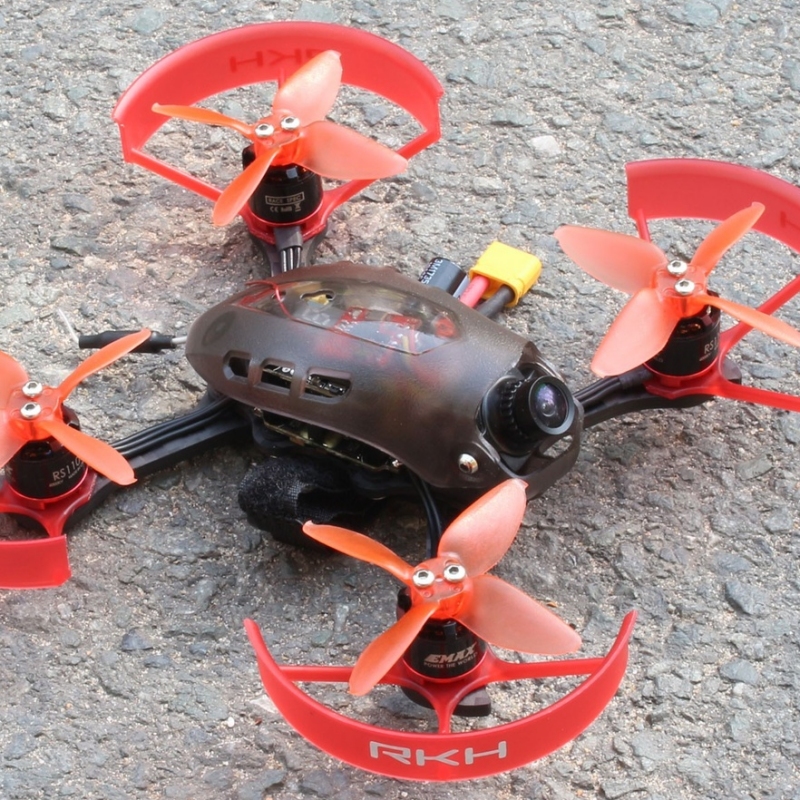
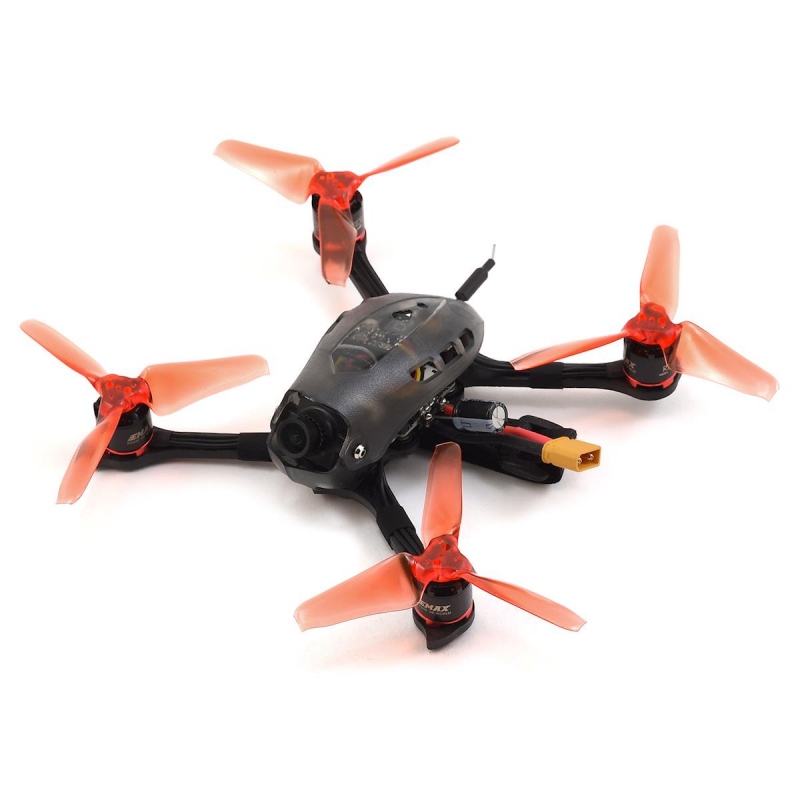
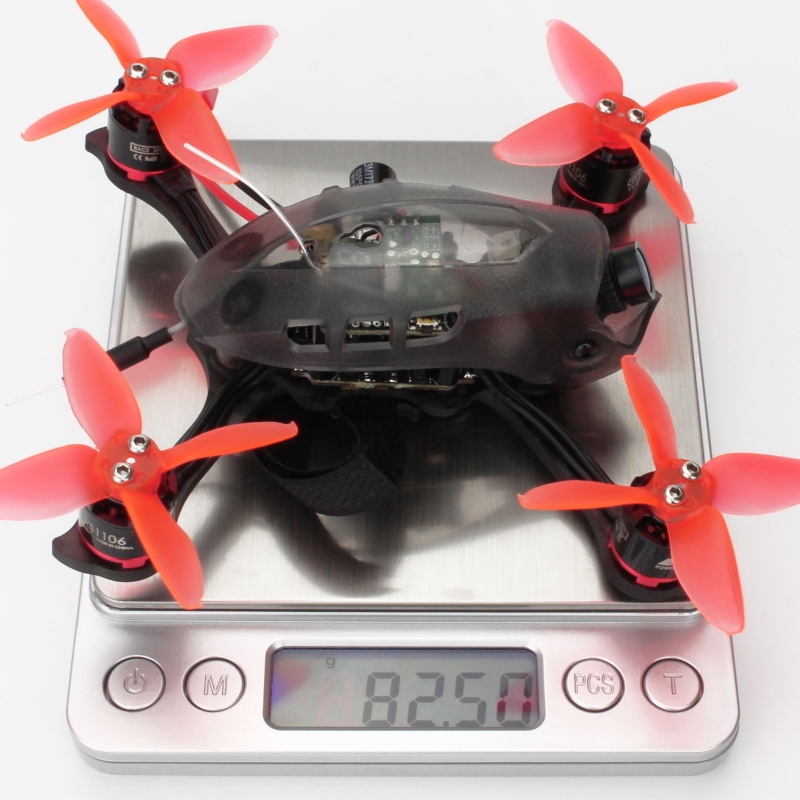
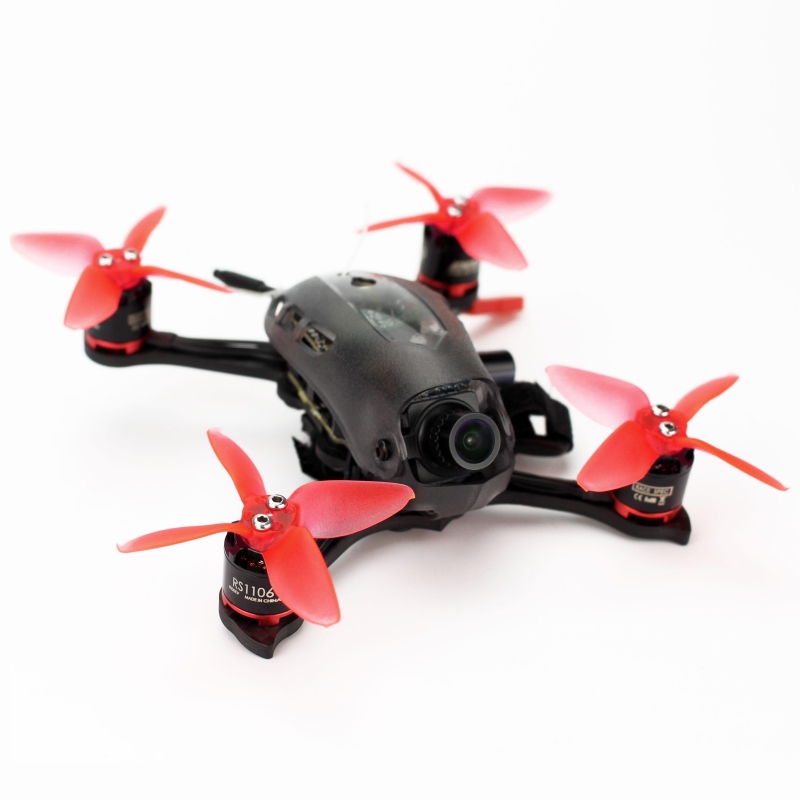
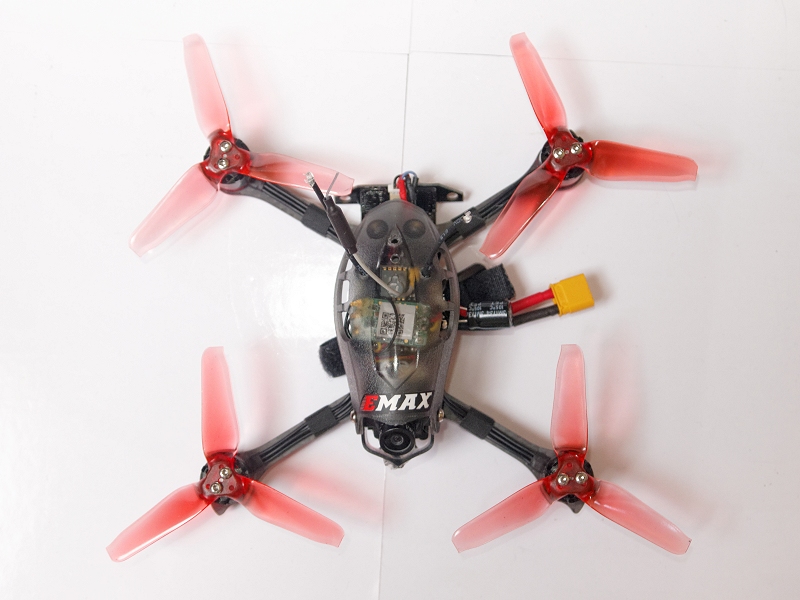
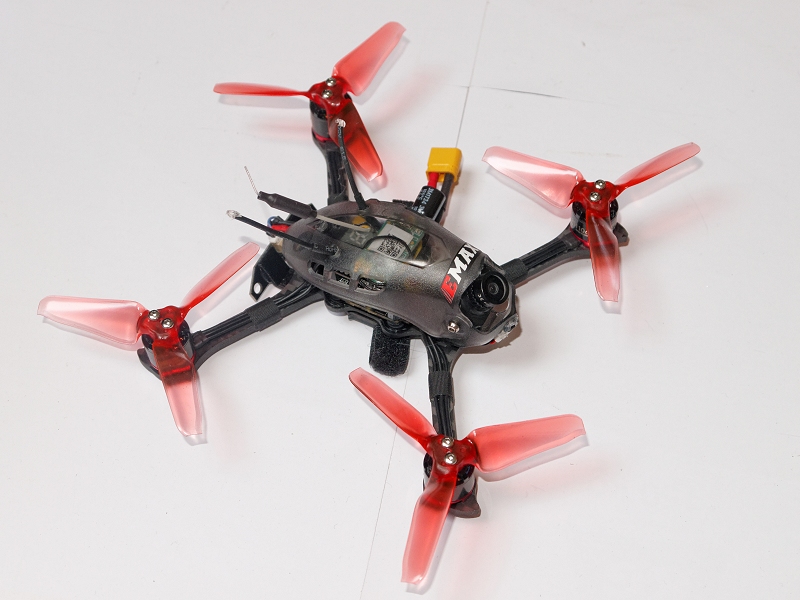
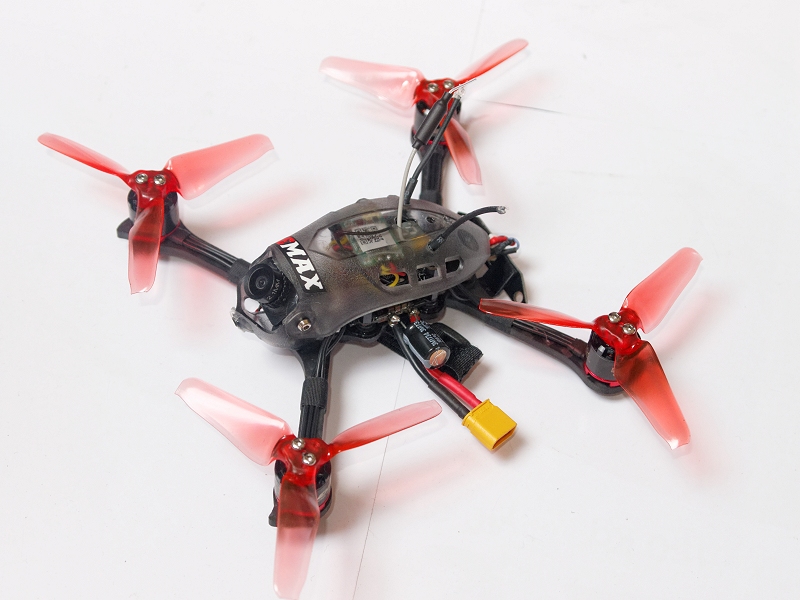


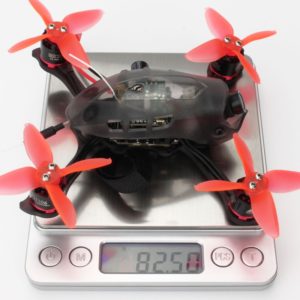




 SHIRTS & HOODIES
SHIRTS & HOODIES 







































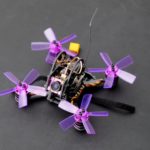
Hello,
I have the babyhawk R 112m by emax and i am confused as i dont know which FPV app i need to view the live videos fron hawk as it travels or do i not need sn app.
Hi, I think you should buy FPV goggles, because all "real" FPV are using analog transmission over 5.8 GHz (babyhawk does). So if you would like to use your tablet or phone (bad idea because of video latency) you should check banggood and look for "USB fpv" device. But it's way better to fly with goggles – even cheap one.
Right. Most racing drones use ANALOG video transmission on the 5.8GHz band. There are dozens of 5.8GHz video goggles available (Fatshark, Eachine, Aomway etc). Camera drones, in contrast, are mostly using DIGITAL video transmission which requires a smartphone app. DIGITAL video transmission is not useful for racing drones because of the noticeable lag (150 milliseconds or more). This is why racing drones all use ANALOG video transmission (no apps – just an analog FPV goggle required).
Vielen Dank für das tolle Review. Aufgrund dieses Tests habe ich mich auch für diesen kleinen Racer entschieden.
Und ich bin begeistert!
Leider hat aber der LED-Mod nicht so richtig funktioniert bei mir. Also eigentlich hat alles funktioniert, aber das Videobild hat ganz verrückt geflackert sobald ich die LED eingeschaltet habe. Ich habe das selbe LED-Board wie hier benutzt. Hattest du das gleiche Problem?
Es könnte sein, daß das Flight Controller Board des Racers nicht mehr genug Strom für den Videosender bereitstellen kann, sobald die LEDs als Verbraucher mit angeschlossen sind – dieses Problem haben viele Minis, vor allem wenn der VTX auf die höchste Sendestufe gestellt ist. Die 5V Schiene der Boards liefert meist nur ~1A, was für Empfänger, Videosender, Kamera, Board und LEDs dann doch sehr knapp ist.
Um dieses Problem zu umgehen, installiere ich bei allen Minis grundsätzlich einen 5V BEC (z.B. der von Matek: https://bit.ly/2Rwjyfs ). Der wird einfach an die Lipokontakte des Racers gelötet und liefert dann genug Ampere für alle benötigten Komponenten.
Hi,
toller Blog!
Wie hast du den LED Strip im Betaflight prgrammiert?
Die leuchten bei mir nur gelb, egal was ich einstelle und zuweise.
Gruß
Rallef
Rallef, hast du den Data Pin des LED Strips mit dem LED Data Pin des Flight Controllers verbunden? Dann sollte es eigentlich funktionieren.
hi, hab den fehler, die V4 der Betaflight macht die LEDś nicht mehr
gruß